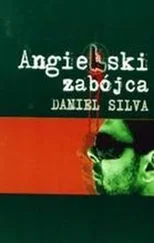“Is that what you wish?”
“Yes, of course.”
“Which one is your wife?”
My father points to my mother. Mengele says, “You there, get out of line and join your husband on the left. Hurry, please, we haven’t got all night.”
I watch my parents walk away to the left, following the others. Old people and small children, that’s who goes to the left. Young and healthy are being sent to the right. I step forward to face the beautiful man in his spotless uniform. He looks me up and down, seems pleased, and wordlessly points to the right.
“But my parents went to the left.”
The Devil smiles. There is a gap between his two front teeth. “You’ll be with them soon enough, but trust me, for now, it’s better you go to the right.”
He seems so kind, so pleasant. I believe him. I go to the right. I look over my shoulder for my parents, but they have been swallowed by the mass of filthy, exhausted humanity trudging quietly toward the gas in neat rows of five.
I cannot possibly tell you everything that took place during the next two years. Some of it I cannot remember. Some of it I have chosen to forget. There was a merciless rhythm to Birkenau, a monotonous cruelty that ran on a tight and efficient schedule. Death was constant, yet even death became monotonous.
We are shorn, not just our heads, but everywhere, our arms, our legs, even our pubic hair. They don’t seem to care that the shears are cutting our skin. They don’t seem to hear our screams. We are assigned a number and tattooed on our left arm, just below the elbow. I cease to be Irene Frankel. Now I am a tool of the Reich known as 29395. They spray us with disinfectant, they give us prison clothing made from heavy rough wool. Mine smells of sweat and blood. I try not to breathe too deeply. Our “shoes” are wooden blocks with leather straps. We cannot walk in them. Who could? We are given a metal bowl and are ordered to carry it at all times. Should we misplace our bowl, we are told we will be shot immediately. We believe them.
We are taken to a barracks not fit for animals. The women who await us are something less than human. They are starving, their stares are vacant, their movements slow and listless. I wonder how long it will be before I look like them. One of these half-humans points me toward an empty bunk. Five girls crowd onto a wooden shelf with only a bit of bug-infested straw for bedding. We introduce ourselves. Two are sisters, Roza and Regina. The others are called Lene and Rachel. We are all German. We have all lost our parents on the selection ramp. We form a new family that night. We hold each other and pray. None of us sleeps.
We are awakened at four o’clock the next morning. I will wake at four o’clock every morning for the next two years, except on those nights when they order a special nighttime roll call and make us stand at attention in the freezing yard for hours on end. We are divided into kommandos and sent out to work. Most days, we march out into the surrounding countryside to shovel and sift sand for construction or to work in the camp agricultural projects. Some days we build roads or move stone from place to place. Not a single day passes that I am not beaten: a blow with a club, a whip across my back, a kick in the ribs. The offense can be dropping a stone or resting too long on the handle of my shovel. The two winters are bitterly cold. They give us no extra clothing to protect us from the weather, even when we are working outside. The summers are miserably hot. We all contract malaria. The mosquitoes do not discriminate between German masters and Jewish slaves. Even Mengele comes down with malaria.
They do not give us enough food to survive, only enough so that we would starve slowly and still be of service to the Reich. I lose my period, then I lose my breasts. Before long, I too look like one of the half-humans I’d seen that first day in Birkenau. For breakfast, it’s gray water they call “tea.” For lunch, rancid soup, which we eat in the place where we are working. Sometimes, there might be a small morsel of meat. Some of the girls refuse to eat it because it is not kosher. I do not abide by the dietary laws while I am at Auschwitz-Birkenau. There is no God in the death camps, and I hate God for abandoning us to our fate. If there is meat in my bowl, I eat it. For supper, we are given bread. It is mostly sawdust. We learn to eat half the bread at night and save the rest for the morning so that we have something in our stomachs before we march to the fields to work. If you collapse at work, they beat you. If you cannot get up, they toss you onto the back of a flatbed and carry you to the gas.
This is our life in the women’s camp of Birkenau. We wake. We remove the dead from their bunks, the lucky ones who perish peacefully in their sleep. We drink our gray tea. We go to roll call. We march out to work in neat rows of five. We eat our lunch. We are beaten. We come back to camp. We go to roll call. We eat our bread, we sleep and wait for it all to begin again. They make us work on Shabbat. On Sundays, their holy day, there is no work. Every third Sunday, they shave us. Everything runs on a schedule. Everything except the selections.
We learn to anticipate them. Like animals, our survival senses are highly tuned. The camp population is the most reliable warning sign. When the camp is too full, there will be a selection. There is never a warning. After roll call, we are ordered to line up on the Lagerstrasse to await our turn before Mengele and his selection team, to await our chance to prove we are still capable of work, still worthy of life.
The selections take an entire day. They give us no food and nothing to drink. Some never make it to the table where Mengele plays god. They are “selected” by the SS sadists long before. A brute named Taube enjoys making us do “exercises” while we wait so we will be strong for the selectors. He forces us to do push-ups, then orders us to put our faces in the mud and stay there. Taube has a special punishment for any girl who moves. He steps on her head with all his weight and crushes her skull.
Finally, we stand before our judge. He looks us up and down, takes note of our number. Open your mouth, Jew. Lift your arms. We try to look after our health in this cesspool, but it is impossible. A sore throat can mean a trip to the gas. Salves and ointments are too precious to waste on Jews, so a cut on the hand can mean the gas the next time Mengele is culling the population.
If we pass visual inspection, our judge has one final test. He points toward a ditch and says, “Jump, Jew.” I stand before the ditch and gather my last reserves of strength. Land on the other side and I will live, at least until the next selection. Fall in, and I will be tossed onto the back of a flatbed and driven to the gas. The first time I go through this madness, I think: I am a German-Jewish girl from Berlin from a good family. My father was a renowned painter. Why am I jumping this trench? After that, I think of nothing but reaching the other side and landing on my feet.
Roza is the first of our new family to be selected. She has the misfortune of being very sick with malaria at the time of a big selection, and there is no way to conceal it from Mengele’s expert eyes. Regina begs the Devil to take her too, so that her sister will not have to die alone in the gas. Mengele smiles, revealing his gapped teeth. “You’ll go soon enough, but you can work a little longer first. Go to the right.” For the only time in my life, I am glad not to have a sister.
Regina stops eating. She doesn’t seem to notice when they beat her at work. She has crossed over the line. She is already dead. At the next big selection, she waits patiently on the endless line. She endures Taube’s “exercises” and keeps her face in the mud so he will not crush her skull. When finally she reaches the selection table, she flies at Mengele and tries to stab him through the eye with the handle of her spoon. An SS man shoots her in the stomach.
Читать дальше












